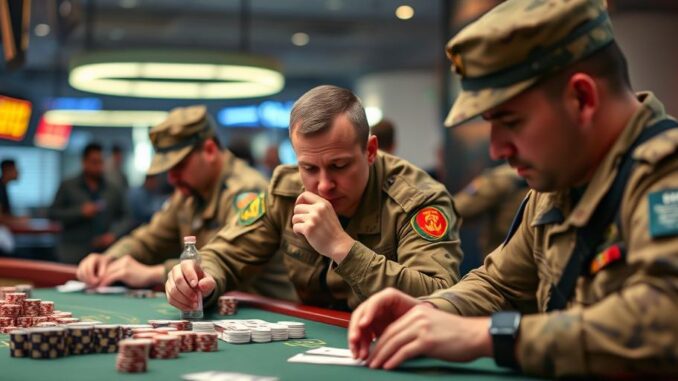
Summary
Gambling addiction is increasingly affecting US military personnel, posing a threat to national security and personal well-being. Factors like stress, trauma, and easy access to gambling contribute to this issue. Fortunately, specialized treatment programs offer hope and support for affected service members and veterans.
** Main Story**
Gambling addiction? Yeah, it’s a real problem within the US military. It’s not just a few isolated cases, we’re talking about thousands of active-duty service members and veterans caught in its grip. And honestly, the surge in these cases? It’s a serious threat. It impacts everything, from national security to the financial stability and overall well-being of our military folks and their families. So, let’s dive into what’s fueling this issue, what the consequences are, and most importantly, where people can turn for help.
What’s Behind the Rise in Gambling Addiction?
Several things contribute to the higher risk of gambling addiction among military personnel. It’s a complex issue, not just a matter of willpower.
-
Stress and Trauma: Military life… I mean, you can’t even imagine unless you’ve lived it. High-stress situations, trauma, deployments – it’s relentless. Gambling, with its promise of a temporary escape and that little thrill, it’s easy to see how it can become a dangerous coping mechanism. It’s like, for a little while, they can forget everything else.
-
Easy Access: Think about it. Military bases are often near casinos, and some overseas bases even have slot machines on base. That’s basically putting temptation right in front of people who are already vulnerable. Why would you even do that?
-
Financial Strain: Let’s be real. The stresses of military life, coupled with financial difficulties, that’s a recipe for disaster. Someone might gamble, chasing that quick financial win, but that just drags them deeper into the cycle of addiction. I’ve seen it happen, and it’s heartbreaking.
-
Mental Health: PTSD, depression, anxiety… these are all too common in the military community. And they make you even more susceptible to gambling addiction. It’s often not a standalone issue; it’s tangled up with other mental health struggles.
The Devastating Consequences
The consequences of gambling addiction, they are just devastating. It’s not just about losing money; it affects every single aspect of a service member’s life.
-
Financial Ruin: Uncontrolled gambling can lead to significant debt, I mean really significant. Financial hardship, bankruptcy – it impacts families and can even jeopardize their military careers. Who can focus when you are worried about your bills constantly?
-
Mental Health Decline: Gambling addiction tends to make pre-existing mental health conditions a whole lot worse. Increased rates of depression, anxiety, and suicidal thoughts… it’s a dark road, and it’s so much harder to get out of when you’re dealing with addiction.
-
Relationship Problems: The stress of addiction damages relationships with family and friends, leading to isolation and even more emotional distress. It’s like a snowball effect – things just keep getting worse.
-
Security Risks: This is something people don’t always think about, but it’s crucial. Financial distress and compromised judgment, those are serious security risks. It could potentially jeopardize sensitive information and missions, and that’s not something we can afford.
Where to Find Help: Resources and Programs
The good news is, there are resources available. The military community is starting to take this seriously, and there are people who want to help. It may not be obvious to find these facilities, so here’s a short list:
-
VA Treatment Facilities: The Department of Veterans Affairs (VA) runs these specialized residential treatment facilities specifically for gambling addiction. They also partner with civilian facilities nationwide. Comprehensive care for veterans who need it.
-
Military Support Programs: Each branch of the military offers programs and resources for active-duty service members struggling with gambling addiction. Don’t be afraid to reach out.
-
National Council on Problem Gambling (NCPG): They’ve got resources, support, and referrals to treatment centers for both military and civilian populations. It’s a great place to start if you don’t know where else to turn.
-
Support Groups and Peer Networks: Talking to people who get it, who understand the challenges, that can be invaluable. Support groups and peer networks offer a safe and encouraging place to share your experiences. They can really foster accountability.
The Gambling Addiction Prevention (GAP) Act
Then there is the GAP Act. It is aiming to address gambling addiction within the military. The goal being to mandate the Department of Defense to develop prevention and treatment programs, and to provide educational materials. The plan is to also include gambling disorder in its regulations and guidance. It’s not fully implemented yet, but this legislation is a big step in the right direction.
A Final Thought
Look, gambling addiction is a serious problem. But, it’s not a life sentence. Help is available. With the right resources, support, and commitment, breaking free from addiction is possible. The military community can play a huge role in supporting those affected, guiding them on the path to recovery and well-being. And honestly? I think we need to break down the stigma. We need to encourage people to seek help without fear of judgment.


Be the first to comment